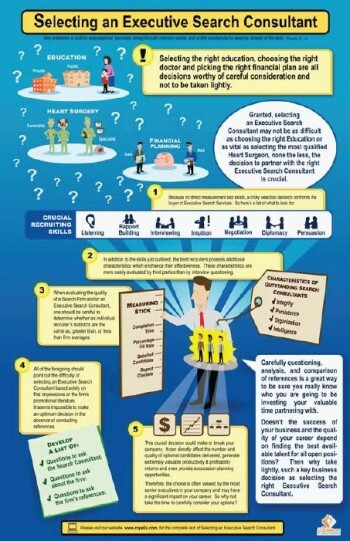Steve Sheridan, Director of Human Resources & Recruiting at NanoAero Technologies, sensed a gathering storm. The cause for his concern was the organizational chart of the 250 middle management positions across the corporation’s three primary business units. "I don’t like where this is headed…our succession plans are really weak" he commented to himself.

The past three years at NanoAero had been unusually calm from a recruiting perspective. Employee turnover became virtually nonexistent as the economy fell into a deep recession and the previously robust job market pretty much dried up. Baby boomers also held onto their jobs as plunging investment portfolios and crumbling real estate values made early retirement a dream of the past. As a result of low turnover and hiring freezes at NanoAero, Steve’s HR department had experienced three rounds of layoffs, so he’s now down to just two recruiters and himself.
"Just because they haven’t left, doesn’t mean they won’t once the economy picks up," thought Steve, referring to the 45% of his middle managers who are part of the baby-boomers generation.
Steve was interrupted by a knock on his door. It was Susan Graybar, one of his two remaining recruiters.
"Thought you’d be interested in this," Susan said as she passed a sheet of paper across the desk to Steve.
"It’s the turnover report," Susan quipped. "Guess I’m going to have a bit more job security now."
"That’s one way of looking at it…," Steve said. "How many open jobs are on the list?"
"Twelve," Susan replied.
"What?" Steve exclaimed. "In one quarter? That’s more than we had all last year!"
"I guess the rebound in the stock market and all that positive economic news has made some people decide that they can now finally leave. I’m guessing that this is just the tip of the iceberg."
"You’re probably right." Steve’s eye caught sight of Don Williams striding by his office. "Hey Don, step in here a minute will you. I want to get your input on something."
Don was Steve’s most experienced recruiter, having weathered numerous economic cycles.
"Don, you were recruiting here back in 2001 as I recall. That’s the last time we had a recession and rebound. What did you learn from that experience? I think we’re about to go through this again."
"Oh, you saw the turnover report too?" asked Don. "I’d say that we’re about to be putting in some really long hours to keep up!"
"I guess you could call job security and being worked to death the same thing," chimed in Mary.
"OK you two, that’s enough," frowned Steve. "This is serious. It’s obvious that we are about to get real busy with recruiting, so I want to know what you two learned the last time you went through this."

"Well, it was somewhat of a hairball to be totally honest with you," said Don. "The company had cut back the recruiting department to the bone and we wasted a lot of time trying to get approval to add more staff recruiters. The CFO kept saying ‘We need to be cautious’, while the hiring managers pressed, ‘We need to fill these critical positions and we need to fill them fast.’ Back and forth we went; meanwhile the open jobs kept piling up on my desk. So, I’d think about lining up some very solid outside recruiting resources real quick."
"Maybe we’re being too alarmist here," said Susan. "I mean, what about all the succession planning that’s supposed to be taking place? Shouldn’t a lot of these jobs be filled internally?"
"That’s what I hoped for when I met with Ben Gotham," said Steve, referring to NanoAero’s CEO. "The problem is that when the economy tanked in 2008, turnover virtually disappeared, and the emphasis on succession planning, special skills training and leadership development went away as well. It just didn’t seem as important in the heat of the crisis as budgets were incredibly tight. Hindsight being 20/20, that’s proven to have been a big mistake, especially since some of our high-potentials have jumped ship. I believe most left because they saw that the older mid-level managers weren’t leaving, and it didn’t seem like they were being groomed anymore either.
"Hey, with that said… check this out," said Susan. "Today I was reading about this in my Human Resource Executive magazine… hang on a second, I think it’s here in my laptop bag. Here it is…‘Based on a survey by Opinion Research Corp., out of Princeton, when opportunity knocks 80% of all Americans say they would consider leaving their current job if presented with other opportunities.’ I was shocked when I saw that number. Then it was followed up with this, ‘Based on another survey by Right Management, (one of the world’s largest outplacement firms) when workers in North America were asked: Do you plan to pursue new opportunities when the economy improves in 2010? They responded like this: 60% said Yes, I intend to leave, 21% said Maybe, so I’m networking, 6% said Not likely, but I’ve updated my resume - so I’m open. And only 13% said No, I intend to stay.’"
"So that means over 80% of our employees could be restless too, and most are poised to make a change. Wow, that’s a huge eye opener," said Steve.
"So, that means we’re going to need to look outside for most of the talent we need," said Don.
"It sure does look that way," Steve said. "Moreover, we’re going to have to make sure that everyone we recruit at the mid-management level has got advancement potential, since this turnover issue is going to hit the senior ranks as well."
"Don’t count on the job boards being much help here," said Susan. "We’re not likely to find much of the highly-specialized talent with the real advancement potential we need, from websites."
"Nope, we’re simply going to have to get on the phone and start recruiting into our competitors," said Don.
"Well, let’s hold on a minute before you go down that road," said Steve. "Remember, this is a smaller industry than we sometimes think. Word about us directly poaching from our competitors is going to get back to our CEO real quick. He’s called me out in the hallway on this before and made it real clear that he doesn’t want any more of our competitors’ CEOs calling him on the carpet. Hey, I just don’t want to get us in hot water again."
"Look, there are a lot of choices for recruiting firms to partner with that can help us with that issue and the heavy lifting we’ve got in front of us. Let’s set up some criteria to sort them out," suggested Susan, grabbing a notepad.
"They’ve got to specialize in our industry and be used to handling very tough, highly-unique searches" said Steve.
"That’s a no-brainer. They better have good research and networking capabilities since we simply don’t have time to get someone up to speed. What else?" asked Don.
"No resume dumpers," said Susan, rolling her eyes. "They just flood us with paper. They all say they won’t, but then they turn on the fire hose - throwing resumes at us just to see what sticks - with little to no screening. Plus, they’re always checking in to make sure that you got the resume from them and not someone else. Did I tell you about the time I was threatened to be sued by a contingency firm because they claimed they sent in a candidate’s resume first, when we found the same resume on monster.com? And the candidate wasn’t even really that good… ooh, that made me mad."
"OK, I agree," said Steve. "Plus, we really want someone who can function as our recruiting partner. Someone who can take a consultative approach, but also has a great sense of urgency. Not pushy - but understands how to create alignment with us, and also someone that knows how to move fast, as we all know that taking too much time - kills all deals."

"Don’t forget help in negotiating the offer," chimed in Susan. "That’s real important. I like working with recruiters who 1) give me an honest assessment of my odds of landing each candidate finalist, not just the one they like. I’ve been burned too often in the past when the family all of a sudden doesn’t support the change, then the candidate turns our offer down. And 2) a recruiter who can tell me where the gaps are in my offer that could sink the closing of the deal. I like to know that if I’m going to take the time to negotiate, prepare, and get all the signatures I need to extend an offer - that the candidate is going to actually accept. Good recruiters cover all those bases."
"That’s it, you nailed it - that’s the consultative approach I was talking about," said Steve.
"OK then, that’s pretty good list of issues. So who do you two think we should we be talking to?" Asked Don.
Let’s Google for firms that specialize in our specific industry niche, who have experience filling the kinds of positions we’re going to be recruiting for. We can narrow the list down to a handful and then interview them to see how they stack up against this criteria," said Steve, as he spun his chair around to his computer…




